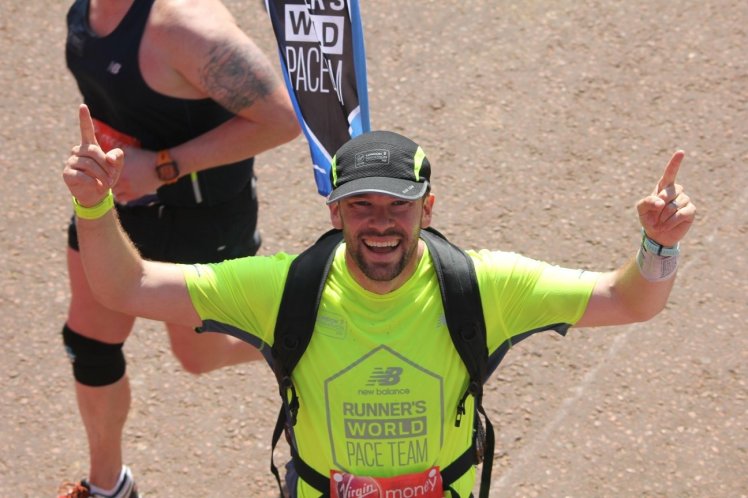Marathon season is upon us, and one of the most feared things in marathon running is hitting the wall. No doubt if you are a first time marathon runner you will be concerned about finishing, and leading up to race day it is natural to be full of doubt. Regardless of how many marathons you have run, the one thing we have in common is we want to avoid hitting the wall, as this usually leads to a painful and much slower marathon than desired.

If you are considering a marathon, please take a look at this blog post HERE, which is full of tips for running a marathon. Let’s assume you have already decided, and you are reading this blog now, wanting to avoid the wall. I hope this blog will help prepare you to have the best race possible.
What is the wall?
The wall, or “bonking” is when you run out of energy. Your body fuels through glycogen (carbs), or burning fat. You will typically use up your glycogen first, and it is when our body starts using its fat stores that we “bonk”. There is research out there about training your body to use fat stores efficiently. This however will take time to get your body used to, so not something I am going to be exploring during this blog.
We respond to hitting the wall differently, but in short you will feel like you cant go on. You may feel dizzy get a headache or feel nauseous, you may get cramps, and struggle to move, or you may just feel like you have no energy. A feeling that you dont want to have when you still have miles still to run. It is possible to carry on when you hit the wall, and taking on sugar can bring you out of it. However the best thing to do is to avoid hitting the wall in the first place.

There is a lot of advice out there about the wall. I personally think it can be simplified into 4 specific areas: Training; Nutrition; Pacing; confidence.
Training
You will see in training plans that miles increase, and you get used to long runs. This is not just to just physically run the distance, it’s to train your body to run the distance. If your body is not used to burning fat stores, or using glycogen efficiently, then you are more likely to suffer come race day. You can also practice your fuelling strategy to look at what your body needs to keep going. The better your training, the better prepared you will be for race day.

Nutrition
Regardless of how much you train, your body will not store enough glycogen to last you a marathon. Therefore you need to either train your body to function on fat stores, or look to replenish glycogen.
Before
You dont need to go silly in the days leading up to your marathon, but eating carb rich meals will benefit you on race day. Maximise your glycogen stores to enable you to keep going for longer. Alongside carbs you should ensure you are eating enough protein to repair muscles, and make sure you stay hydrated. I always like to carb load on pizza and pasta the days before a marathon.
During
There are many different products out there, so I would suggest practicing with different ones to find out what works for you. Gels, sports drinks, fruit, sweets, there are various options. As you are depleting your glycogen stores you need to replace these, and if done right you wont find that wall.
There is different research out there about how much you need based on your weight and intensity you are running. When replacing just think about glycogen calories. Weight watching and calorie counting doesn’t go well with marathon running, unless it is to make sure you are eating enough. I always fuel with a sports drink before an event, and like to take cliffbar shot blocs or gels/sweets around every 5k. This may be too much, but it works for me. I love events like London Marathon that have lucozade on course, as I find this really helps me.
If you ever feel like you are running out of energy it is probably too late. It will take about 20 minutes for gels etc to get to work, and so you need to be taking these at least 20 minutes before you need it. This brings me back to training, practice your nutrition strategy.
After
After the event you may not feel hungry immediately. Drink water to hydrate, and try to take on protein / carbs to replace energy and start repairing muscles. Much research would indicate that the first hour is crucial to recovery. The quicker you can refuel, the quicker your body will recover.

Pacing
Getting your training and nutrition right is crucial, but when it comes to race day pacing makes a huge difference. If you are running at the right pace for you, then you wont deplete your glycogen stores as quickly, making it easier to replenish. If you go off too fast you will burn energy quickly and this can result in the build up of lactic acid and hitting the wall quicker.
I am a big advocate of running an even pace, and you can learn more about getting your pace right in my blog HERE. If you feel strong towards the end you will then have more energy for a strong finish and negative split.

Confidence
Aside from the physiological effects of hitting the wall, don’t underestimate the mental side. Your body will try slowing you down as you deplete your glycogen stores, and as it gets tough your natural response will be to stop. Have the confidence to push on, as this self belief can make all the difference. Once it gets to race day most of the battle is mental, remember this and think of strategies to keep you going.

I’ve hit the wall numerous times in the past. I’ve failed on every bit of advice I’ve given above. I’ve not trained properly, I’ve been careless with fueling, I’ve gone off too fast, and ive given up many times. So not matter how your run goes just make sure you try and enjoy the experience. Learn from your own experience, and do the best you can. Hopefully if you get the points above right, you can avoid the wall.
Wherever you are running next, remember to believe in yourself, have fun and crash through that wall. If you have a marathon coming up then I wrote a blog last year about what to expect on marathon race day, HERE.
Thanks for this writing this post! Two marathons in I haven’t hit the wall. Maybe because I’m so paranoid about it that I dedicate the entire pre-race week to properly carbo loading and plan my recovery like an old lady. You’ve shred some great tips to always keep in mind!
LikeLike